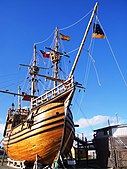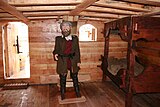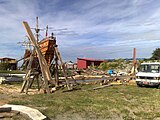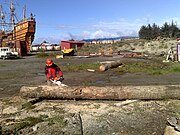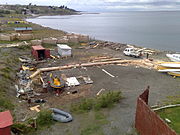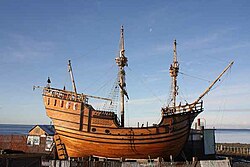 Nao Victoria Replica in the museum | |
| Established | 2011 |
|---|---|
| Location | Punta Arenas, Chile |
| Type | Maritime Museum |
| Website | https://www.registromuseoschile.cl/663/w3-article-83699.html |
The Nao Victoria Museum is a private maritime museum located in Punta Arenas, Chile. It has been open to the public since 1 October 2011. The museum offers interactive displays featuring replicas of the ships that contributed to the discovery of the area, helped colonize the territory, or had a special and historic heritage significance for the Magallanes Region of Chile. The replicas were built using traditional shipbuilding techniques.
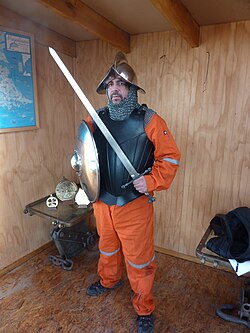
Collections
The main collection of the museum is the full-size replicas of historic ships on display along the Straits of Magellan. Replicas of weapons and ancient navigation tools are also exhibited, as well as copies of documents and books relating to the historic ships and an outdoor shipbuilding workshop.
Replicas
Today the museum has three ship replicas:
Nao Victoria
The Victoria was a nao ( carrack), 27 metres (89 ft) long, 7 metres (23 ft) wide, that was part of the fleet commanded by Ferdinand Magellan that discovered the waterway around southern tip of the South American continent. Later, commanded by Juan Sebastian Elcano, she was the only ship of the five to complete the first-time circumnavigation of the globe. Commanded by Duarte Barbosa, the Victoria participated in the discovery by Europeans of Chile, being the first to explore the region, in 1520, and discovering or naming Patagonia, Cape Virgenes, the Straits of Magellan, Tierra del Fuego, the Pacific Ocean and other landmarks.
James Caird
James Caird was a lifeboat of the Endurance, adapted by carpenter Harry McNish to sail from Elephant Island to South Georgia during Sir Ernest Shackleton's 1916 Imperial Trans-Antarctic Expedition. A party of six, including Shackleton and Frank Worsley, made their way for 17 days and 1,300 km (800 miles) across the notorious Drake Passage, battling gales and icing, with Worsley navigating based sextant readings of the seldom visible sun taken from the pitching boat. They managed to locate South Georgia Island and obtained rescue for the stranded expedition.
-
The replica of James Caird afloat in the river next to the museum.
-
The replica of James Caird to the Strait of Magellan, with in the background the Tierra del Fuego.
-
The replica of James Caird in the workshop before being released in the museum.
-
The original James Caird displayed at Dulwich College, London.
-
The replica of James Caird at the Museo Nao Victoria in winter with snow.
Schooner Ancud
Ancud was the ship that, under an 1843 mandate of the President of Chile, Manuel Bulnes, claimed the Strait of Magellan on behalf of Chile's newly independent government, building Fort Bulnes. The commander of the schooner was Captain John Williams Wilson. On 31 December 2011, the museum announced the construction of a replica of the schooner in its shipbuilding workshop; [1] the replica Ancud was opened to public on 5 September 2012.
HMS Beagle
HMS Beagle, a British Navy brig-sloop, was converted into an exploration vessel. The most famous of her three trips was the second one under the command of Captain FitzRoy. On board was the young Charles Darwin. HMS Beagle remained in the Magellan Region for almost three years, and the observations made by Darwin were influential in the development of his theory of evolution. The construction of the full-size HMS Beagle replica started in November 2012. [2] Four years later, in November 2016, the museum announced that the vessel was completed. [3]
-
First cut for HMS Beagle's keel.
-
Keel, stem and stern of the 1:1 replica of HMS Beagle ready for installation in Nao Victoria Museum of Punta Arenas
-
Nao Victoria looming over HMS Beagle's replica construction site
-
Starboard side view of HMS Beagle's replica
-
State of HMS Beagle's replica building process as of 20 March 2013
-
Completed hull of the 1:1 replica of HMS Beagle being painted in Nao Victoria Museum in Punta Arenas
-
The replica in February 2016
-
Update on the construction of the replica in February 2017
-
Replica of HMS Beagle 2018
Other collections
- Antique weapons – The replicas of historic ships are equipped with replicas of ancient firearms such as bombards, cannons, and muskets as well as handweapons like halberds, crossbows, and swords. All these weapons can be used by visitors.
- Ancient sailing instruments – In the different areas of the boats there are replicas of astrolabes, nocturnals, quadrants, Jacob's staffs, chip logs, and hourglasses.
- Copies of original documents – The capitulation and instructions given by Emperor Charles V to Magellan and Ruy Faleiro, the accounts of the Atarazanas Reales de Sevilla on the expenditures and revenues of the expedition, the log of Francisco Albo, Ginés de Mafra's book, the de Moluccis Insular of Maximilianus Transylvanus, drawings from the book of Antonio Pigafetta, the map of Juan de la Cosa, the book Primaleon of Francisco Vasquez of Palmerin.
Shipbuilding workshop
During summer 2013 the shipbuilding workshop of the museum built a one-third scale replica of an 18th-century galleon. [4]
-
Figurehead of 1:3 scale replica of a Galleon built in Santiago by the Nao Victoria Museum Punta Arenas
-
Transom of 1:3 scale replica of a Galleon built in Santiago by the Nao Victoria Museum of Punta Arenas
-
Starboard view of a 1:3 scale replica of a Galleon built in Santiago by the Nao Victoria Museum of Punta Arenas
See also
References
- ^ "Construirán réplicas navegables de la goleta Ancud y del bergantín Beagle". La Prensa Austral (in Spanish). 31 December 2011. Archived from the original on 2013-11-01. Retrieved 2012-09-20.
- ^ "Construyen Replica del HMS Beagle". radiopolar.com (in Spanish). 15 November 2012. Retrieved 2012-11-16.
- ^ "Réplica de la embarcación HMS Beagle fue terminada tras cuatro años de construcción". La Prensa Austral (in Spanish). 27 November 2016. Retrieved 7 April 2019.
- ^ "The 1:3 replica of a galleon of the eighteenth century". April 28, 2014. Retrieved 2014-04-29.
External links
![]() Media related to
Museo Nao Victoria (Chile) at Wikimedia Commons
Media related to
Museo Nao Victoria (Chile) at Wikimedia Commons
 Nao Victoria Replica in the museum | |
| Established | 2011 |
|---|---|
| Location | Punta Arenas, Chile |
| Type | Maritime Museum |
| Website | https://www.registromuseoschile.cl/663/w3-article-83699.html |
The Nao Victoria Museum is a private maritime museum located in Punta Arenas, Chile. It has been open to the public since 1 October 2011. The museum offers interactive displays featuring replicas of the ships that contributed to the discovery of the area, helped colonize the territory, or had a special and historic heritage significance for the Magallanes Region of Chile. The replicas were built using traditional shipbuilding techniques.

Collections
The main collection of the museum is the full-size replicas of historic ships on display along the Straits of Magellan. Replicas of weapons and ancient navigation tools are also exhibited, as well as copies of documents and books relating to the historic ships and an outdoor shipbuilding workshop.
Replicas
Today the museum has three ship replicas:
Nao Victoria
The Victoria was a nao ( carrack), 27 metres (89 ft) long, 7 metres (23 ft) wide, that was part of the fleet commanded by Ferdinand Magellan that discovered the waterway around southern tip of the South American continent. Later, commanded by Juan Sebastian Elcano, she was the only ship of the five to complete the first-time circumnavigation of the globe. Commanded by Duarte Barbosa, the Victoria participated in the discovery by Europeans of Chile, being the first to explore the region, in 1520, and discovering or naming Patagonia, Cape Virgenes, the Straits of Magellan, Tierra del Fuego, the Pacific Ocean and other landmarks.
James Caird
James Caird was a lifeboat of the Endurance, adapted by carpenter Harry McNish to sail from Elephant Island to South Georgia during Sir Ernest Shackleton's 1916 Imperial Trans-Antarctic Expedition. A party of six, including Shackleton and Frank Worsley, made their way for 17 days and 1,300 km (800 miles) across the notorious Drake Passage, battling gales and icing, with Worsley navigating based sextant readings of the seldom visible sun taken from the pitching boat. They managed to locate South Georgia Island and obtained rescue for the stranded expedition.
-
The replica of James Caird afloat in the river next to the museum.
-
The replica of James Caird to the Strait of Magellan, with in the background the Tierra del Fuego.
-
The replica of James Caird in the workshop before being released in the museum.
-
The original James Caird displayed at Dulwich College, London.
-
The replica of James Caird at the Museo Nao Victoria in winter with snow.
Schooner Ancud
Ancud was the ship that, under an 1843 mandate of the President of Chile, Manuel Bulnes, claimed the Strait of Magellan on behalf of Chile's newly independent government, building Fort Bulnes. The commander of the schooner was Captain John Williams Wilson. On 31 December 2011, the museum announced the construction of a replica of the schooner in its shipbuilding workshop; [1] the replica Ancud was opened to public on 5 September 2012.
HMS Beagle
HMS Beagle, a British Navy brig-sloop, was converted into an exploration vessel. The most famous of her three trips was the second one under the command of Captain FitzRoy. On board was the young Charles Darwin. HMS Beagle remained in the Magellan Region for almost three years, and the observations made by Darwin were influential in the development of his theory of evolution. The construction of the full-size HMS Beagle replica started in November 2012. [2] Four years later, in November 2016, the museum announced that the vessel was completed. [3]
-
First cut for HMS Beagle's keel.
-
Keel, stem and stern of the 1:1 replica of HMS Beagle ready for installation in Nao Victoria Museum of Punta Arenas
-
Nao Victoria looming over HMS Beagle's replica construction site
-
Starboard side view of HMS Beagle's replica
-
State of HMS Beagle's replica building process as of 20 March 2013
-
Completed hull of the 1:1 replica of HMS Beagle being painted in Nao Victoria Museum in Punta Arenas
-
The replica in February 2016
-
Update on the construction of the replica in February 2017
-
Replica of HMS Beagle 2018
Other collections
- Antique weapons – The replicas of historic ships are equipped with replicas of ancient firearms such as bombards, cannons, and muskets as well as handweapons like halberds, crossbows, and swords. All these weapons can be used by visitors.
- Ancient sailing instruments – In the different areas of the boats there are replicas of astrolabes, nocturnals, quadrants, Jacob's staffs, chip logs, and hourglasses.
- Copies of original documents – The capitulation and instructions given by Emperor Charles V to Magellan and Ruy Faleiro, the accounts of the Atarazanas Reales de Sevilla on the expenditures and revenues of the expedition, the log of Francisco Albo, Ginés de Mafra's book, the de Moluccis Insular of Maximilianus Transylvanus, drawings from the book of Antonio Pigafetta, the map of Juan de la Cosa, the book Primaleon of Francisco Vasquez of Palmerin.
Shipbuilding workshop
During summer 2013 the shipbuilding workshop of the museum built a one-third scale replica of an 18th-century galleon. [4]
-
Figurehead of 1:3 scale replica of a Galleon built in Santiago by the Nao Victoria Museum Punta Arenas
-
Transom of 1:3 scale replica of a Galleon built in Santiago by the Nao Victoria Museum of Punta Arenas
-
Starboard view of a 1:3 scale replica of a Galleon built in Santiago by the Nao Victoria Museum of Punta Arenas
See also
References
- ^ "Construirán réplicas navegables de la goleta Ancud y del bergantín Beagle". La Prensa Austral (in Spanish). 31 December 2011. Archived from the original on 2013-11-01. Retrieved 2012-09-20.
- ^ "Construyen Replica del HMS Beagle". radiopolar.com (in Spanish). 15 November 2012. Retrieved 2012-11-16.
- ^ "Réplica de la embarcación HMS Beagle fue terminada tras cuatro años de construcción". La Prensa Austral (in Spanish). 27 November 2016. Retrieved 7 April 2019.
- ^ "The 1:3 replica of a galleon of the eighteenth century". April 28, 2014. Retrieved 2014-04-29.
External links
![]() Media related to
Museo Nao Victoria (Chile) at Wikimedia Commons
Media related to
Museo Nao Victoria (Chile) at Wikimedia Commons
